Alumni Profiles
Chris Tritico
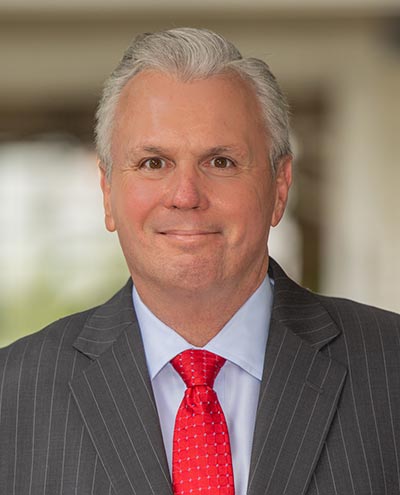
Christopher Tritico earned his Bachelor of Science Degree in Political Science from Sam Houston State University in 1983. Since then, he has accomplished many things. Today he works as a criminal defense attorney for Tritico & Rainey as well as being an active alumnus in the SHSU community and serves on the CHSS Advisory Board. This year, he is being honored with the 2024 Distinguished Alumni Award.
“It is a great honor and something that so few alumni are bestowed with,” Mr. Tritico said. “I have spent my life trying to live up to the things my parents taught me; honor, ethics, dignity, and caring for others. Sam’s motto plays right into that and my life as a lawyer.”
Mr. Tritico has since shown great interest in representing professional educators. This is shown in his love for the Bearkat community. He strives to keep up the same levels of community as he had back when he was a student.
“Sam Houston’s sense of community always struck me as a true selling point for the university. From the day I first walked on campus through to today, 45 years later, that sense of community is still there,” Mr. Tritico said. “We are a family, a Bearkat network, ready to help each other at any time.”
He recognizes that being a student at SHSU played a major role in where he is today, as he has served on the Alumni Board, President of the Board of Directors, and now also has a seat on the Sam Houston Foundation Board. His time in the political science degree at Sam helped prepare him for every case, every appeal, every client since his graduation.
“I studied political science, because I love politics. I knew I was going to law school. Going through the political science department, the great debates we had in class,” Mr. Tritico said. “It was wonderful preparation for a career in law. I learned from Sam how to make an argument without losing my temper. A skill that is absolutely necessary in law.”
As he serves on the CHSS Advisory Board, he gets to assist the College of Humanities and Social Sciences in coming up with and implementing new ideas and ways that help keep the college moving forward and keeping present and future students satisfied and focused on their open educational endeavors. In regard to his seat on the Foundation he said, “...we have the best job, we approve of the money coming in!”
Christopher Tritico is proud of his alumni status and his ability to keep serving the SHSU community.
“Never forget the university that did so much for you. The alumni association is only as strong as the active members,” he said. “Our university has one of the best and is the most affordable alumni association in Texas. We can keep it that way by our active dues paying members. A strong and active alumnus makes the university better for all the students.”
He aims to keep the school as driven to student success as it was in his time at the university. His continued service is welcome and appreciated by all students, faculty, and staff here at Sam Houston State University. The award is well deserved and well earned!
Charise Lincoln
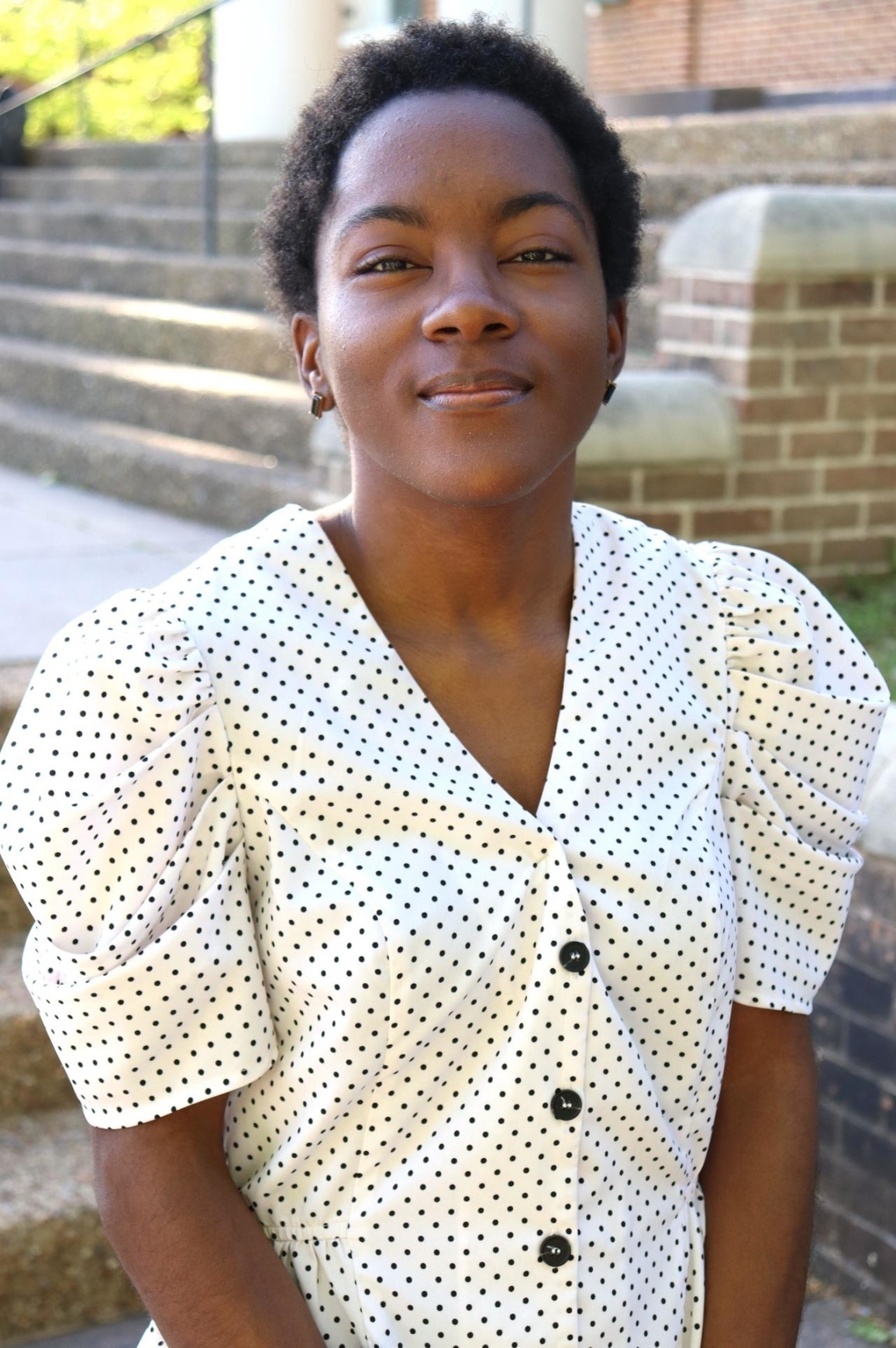 Education is a Privilege: Perseverance in College
Education is a Privilege: Perseverance in College
Interview with Charise Lincoln, SHSU Senior, Major in Psychology with a Minor in Astronomy
Last November, SHSU Senior Charise Lincoln presented at the TEDxSHSU Conference about her three-step plan to persevering in college: mindfulness, community, and calculated risks. In this interview, Charise discusses how she came up with this plan, how her SHSU community has helped her with her goals, and advice for other students.
In Fall 2019, Charise experienced what she described as her last semester as a high achieving honor student. Both her step-father and her mother passed and soon after, the COVID-19 pandemic would result in global lockdowns. “With her [mother’s] death began a month full of anxiety, terror, and panic,” Charise said in her Ted Talk, “for me, the world had stopped.” Despite this, Charise decided to continue her studies and become an advocate for students to persevere.
“It was mostly trial and error,” She explained when asked how she created her three-step plan. “I realized a lot of my struggles came down to those three topics. Like, I wasn’t aware of my emotions or my feelings. I just kept kind of pushing forward and I kept breaking down, crumbling. I realized there was a problem I was able to look at with kindness, and that would actually help that go away. And then the same thing with community. When my parents died, I didn’t have any more friends here on campus. I didn’t have support anymore. And my first thought process was, ‘I can do it all by myself. I don’t need any help.’ And then I realized I need a lot more than I think I do. Once I started letting people in, bit by bit, it became a lot easier. For taking calculated risks, instead of taking risks, I didn’t do anything at all. I didn’t realize that nothing was also a choice too, right? So I had a choice to do something, and then I realized the more risks I took that I know I could do, that the stronger it made me as a person.”
Of the three steps, Charise attributed a lot of her ability to persevere to the community she built at Sam Houston State University, including the faculty and staff. She thanked Michelle Haynes and the counseling team from the Counseling Center for helping her through the grieving process; Bradley Seaberg, Lecturer from the Department of Psychology & Philosophy for “single handedly [making] me so excited to keep going and keep learning”; and Michelle Meers from TRiO Student Support Services for helping her navigate college as a First-Generation student and supporting her as she prepared for her Ted Talk. Charise added that the size of the community isn’t as important as knowing that they genuinely support you and want to help you succeed. For those struggling to find a community, Charise recommended finding a small close-knit organization, searching for groups online, or even participating in group therapy sessions.
The social support from the community has also helped Charise feel confident about her future career goal of becoming a counseling psychologist. “My [psychology] professors work really, really hard to make sure that I can go to grad school, and I’m not blindsided by grad school,” Charise explained. She also plans on continuing her research on the impacts of astronomy on mental health and nature-based interventions as a more accessible method for those who are less privileged.
Charise offered the following for those students considering speaking at a conference:
How did you, while preparing for TEDxSHSU, overcome all the comparison to other presenters and the imposter syndrome? Community helps the best with overcoming imposter syndrome. I’d get stuck in my head and then I won’t take opportunities, get too scared to take risks, I’m just ripping in my head: “I can’t do this, I’m a failure, I’m not worth it.” And then whenever I get someone outside of me who talks to me, they’re like, “You can do this. I can see you. You’ve got this.”
When it comes to who that outside perspective comes from, that person has to be a safe person that respects you and your respect for them. If it’s a safe person that respects you deeply, I think that it holds more value.
When I got approved [to present at TEDxSHSU], I reached out to everyone [in my community network] because I felt so insecure at first. They could see me better than I could see myself. For the entire time, they were like, “Why are you so stressed out right now? You’re going to do fantastic,” and I’m like, “No, I’m not, I’m not going to do fantastic at all,” but then I did do fantastic.
My partner really helped giving me support. I don’t think I would have done it without her, honestly. She was so supportive, and I just wanted to quit so many times. Whenever I gave my speech in front of her and she gave me so much praise and made me realize that I am capable, people will listen to my story.
What would you say to other students who are considering doing a TED Talk or other conference? The TED Talk hosts are trying to convey a journey and an idea to the people. People come away after listening to these speeches with renewed hope or more knowledge about something, and you can always provide hope and knowledge to people. I think anyone can do that. So, any future speakers just know that you can provide something, even if you don’t think you can, you can. They chose you for a reason. They see that in you. Now it’s time for you to show it to other people.
What did preparing for TEDxSHSU look like? A TED Talk coach will be assigned one to two TED Talk speakers, and for six months they’re going to work one-on-one with the speakers, verifying their speech, listening to the speech and giving their input, and if they’re available, they can go [to the TED Talk conference] and listen to their speakers talk, give them more support. My coach was a previous TED Talk speaker. She talked about food insecurity and I felt pretty intimidated because she seemed so educated, so well-informed. It was really, really cool. She broke down what the overall goal was of a talk, and she made the steps a lot more manageable. She took me at it one day at a time. She gave me lots of great support. I think one time we revised and reread the speech like ten times, back-to-back, for almost two hours.
I’m much more used to talking in very small environments. This is probably the largest group that I’ve ever spoken to in my life. I had to practice my speech at least twice as much as I normally do, because there were just so many people there.
Charise is set to graduate August 2024 and plans to start grad school during the upcoming academic year. Charise also presented the first talk on her research on the impacts of astronomy on mental health, “Impact of a Total Solar Eclipse”, this past April at SHSU’s Undergraduate Research Symposium.
Tiffany Venekamp
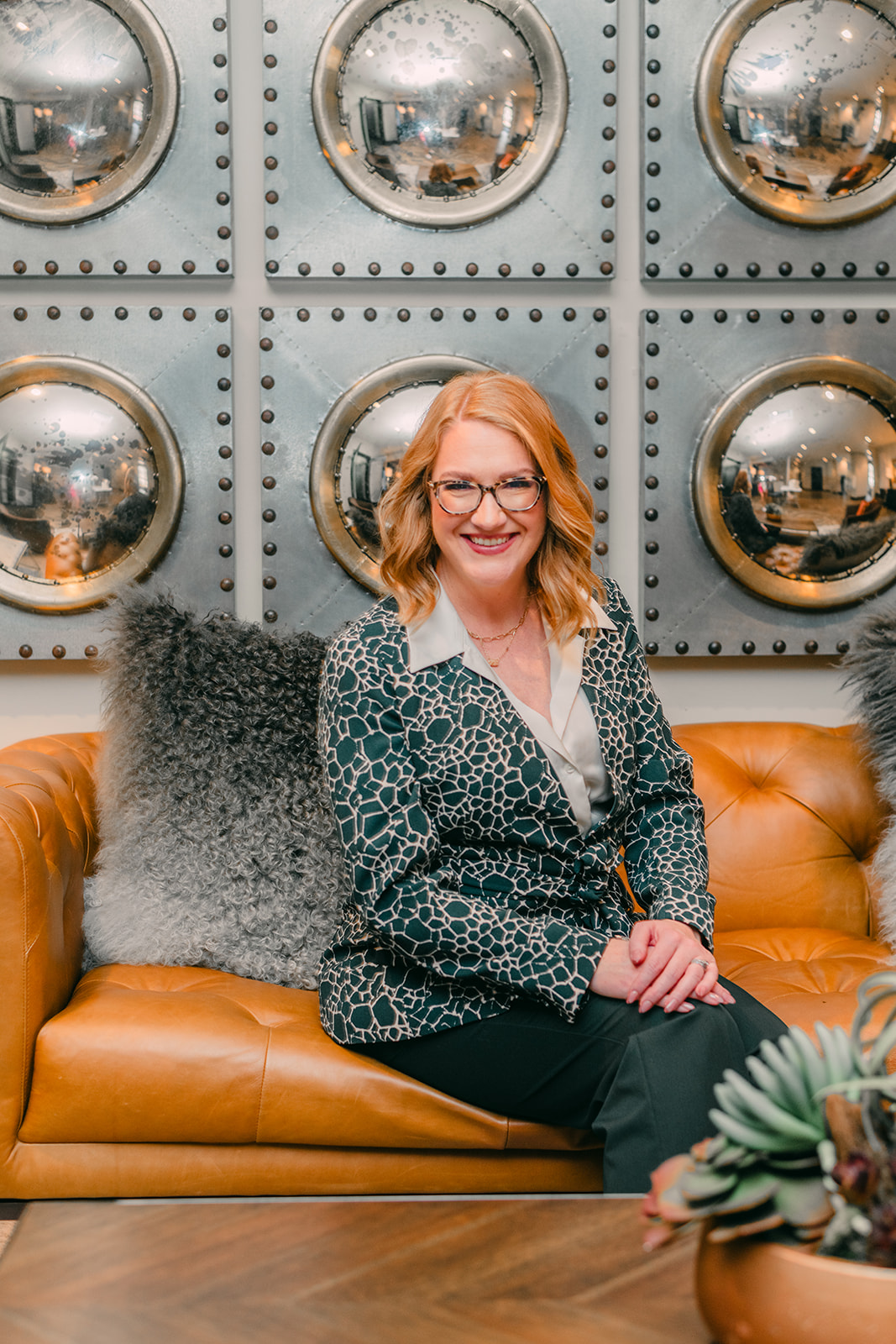 How did being the director of Family Promise of Lake Houston (FPLH) while being in school impacted you? I wasn’t the executive director when I went back to school, I was the program coordinator. I had gone back to school part time because I had realized that when the time came for the previous executive director to move on, I wouldn’t be seriously considered for the role even though I had a lot of work experience in the field unless I had a degree. SHSU is my 7th college that I've been to, and it took me 15 years to finish my degree, but I went back to school in the summer of 2022. I went back part time, so I wasn't promoted into executive director until this past fall of ‘23. I won't lie, it was hard. I wasn't expecting to be promoted yet. There was a lot of stuff happening within our organization and I wasn't quite ready for the transition yet. I was like “This is what I went back to school for, this is what I'm preparing for! But not yet! Can we just please hit the pause button? I have to finish school first!” and so it just was hard, and I wanted to give up and I previously had given up several times when it got hard, but I knew that I didn't really have a choice this time. I had to put away being a perfectionist because when I went back to Sam, I had straight A’s until this last semester. I had to realize that it was ok to not have straight A’s and it wasn't going to matter.
How did being the director of Family Promise of Lake Houston (FPLH) while being in school impacted you? I wasn’t the executive director when I went back to school, I was the program coordinator. I had gone back to school part time because I had realized that when the time came for the previous executive director to move on, I wouldn’t be seriously considered for the role even though I had a lot of work experience in the field unless I had a degree. SHSU is my 7th college that I've been to, and it took me 15 years to finish my degree, but I went back to school in the summer of 2022. I went back part time, so I wasn't promoted into executive director until this past fall of ‘23. I won't lie, it was hard. I wasn't expecting to be promoted yet. There was a lot of stuff happening within our organization and I wasn't quite ready for the transition yet. I was like “This is what I went back to school for, this is what I'm preparing for! But not yet! Can we just please hit the pause button? I have to finish school first!” and so it just was hard, and I wanted to give up and I previously had given up several times when it got hard, but I knew that I didn't really have a choice this time. I had to put away being a perfectionist because when I went back to Sam, I had straight A’s until this last semester. I had to realize that it was ok to not have straight A’s and it wasn't going to matter.
Who was your mentor and how did you go about finding the right mentor to support you at SHSU? I didn't really have a mentor at first. I was just open and chatted with a lot of my professors online. I did talk to Dr, Dahlgren quite a bit online when we were going through our classes and Dr. Brandau for sure this last semester. She [Dr. Brandau] is kind of who kept me afloat to get me through this last semester to graduate so as I moved into this director position, I just think it is really important that when you’re trying to find a mentor that you’re just honest with what you’re looking for. So when I want to have a meeting with Dr. Brandau about my assignments and where I’m struggling she just reminded me that “I’m [Brandau] not here to make this not happen for you, I’m here to help get you to graduation and you don’t have to be scared of anything, just be honest and open up about where you’re coming from and what kind of support you need.” and your professors are going to be there for you.
Being a non-traditional student comes with challenges of course, how did you find a balance with school and other outside activities, jobs, etc.? I just had to be flexible. When my syllabi for my classes came out for the semester, I had to be intentional with making sure that the things were in my schedule, that due dates were in my schedule. That I read what the assignments entailed and understood what comprised my grade. So, I think a lot of mistakes kids make when they get their syllabi is they don’t look at the schedule. I can tell a lot of other students that were in my online classes were not reading the schedule. They would make comments and stuff in the discussion board about not knowing about something or didn’t know that this was due then and I’m just like “but you did because it was in the syllabi” you have to read it. Just being very intentional with my timing and my scheduling when my classes came out was really important because I knew that if I had a paper due around mid-March or spring break, I needed to get it done before it was due because my kids were going to be home all week. So, knowing when the due dates were around my family’s schedule helped me be able to plan like “I need to get this assignment done during this time frame not this one.”
What are your biggest takeaways? Lessons learned? I feel like when I came to Sam I was really prepared to dive in and do what I had to do and finish. Just finish. I think my biggest takeaway from that was “Why didn't you do that sooner? Why didn't you just keep moving forward even if it was a little bit at a time.” because it was worth it. Being able to feel proud about what you've accomplished is something that is not going to ever be taken for granted by yourself I think that that is one of the most important things that you can learn as a non-traditional student, or even as a traditional student is that there isn’t a right or wrong way to go about it [school]. Finishing is finishing and baby steps are baby steps regardless as long as you’re moving forward. It’s going to be worth it.
What was your favorite part/moment of being a Bearkat? Probably sending my daughter there. My daughter is a freshman at SHSU, and I knew that I really liked the culture of the campus just being a non-traditional student even though I’ve never actually been to campus. Before I went on her campus tour, I could tell from how inviting all of our non-traditional student emails were that the intention was put in on trying to connect students that were not always on campus. I could really feel like the connection and campus-connection of being a Bearkat was something that was important there and it was something that sticks with you even as you grow through life. Like you have so much pride in the college that you come from. That’s part of the reason why I struggled as a non-traditional student because I started college like everybody else right out of high school. I had a scholarship to a private university, and I loved it there and my life happened and things didn’t work out but I never felt home anywhere again until I came to Sam. I feel like I was able to push through because I was proud of the college that I was going to because I was doing it for me and not because somebody told me I had to be in school right now. My daughter just started her freshman semester, my last semester, so that was a really cool part to see that. To be able to share my experience with her and then for her to choose that, it was really awesome to me.
Did you ever think about giving up? How did you push through? I did. That last semester was really hard, and I kept thinking what is the point? I obviously was given the director job without my degree and I’m really struggling right now, I’m really having a hard time with these last three classes. What is the point? That’s when Dr. Brandau was just like “Don’t quit, you’re right here, you're going to be so mad at yourself if you quit.” and she was right like I just needed someone else to tell me that, you know? And then all of my professors are asking me when I’m going to start my grad program. I think 3-4 of my classes are using my projects as examples now for the next classes. It was like don’t give up because then what was all that for? I didn’t want my kids to see me give up.
If you could give one piece of advice to other non-traditional students, what would it be? Don’t give up but don’t feel like you have to do a full-time load or full-time courses to keep moving forward. It’s ok to just take 1-2 classes a semester. Every class you finish is one step closer to finishing.</P
How do you think your time at SHSU has prepared you for being the Executive Director of FPLH? So, I struggled with coming back into the workforce for a while because I didn't have a lot of professional communication experience as an adult. So that is one reason why I chose Communications Studies because I really wanted to understand what made people tick a little more and understand conversational relationships not only with my clients here [FPLH] but all the professionals I have to work with on a regular basis. I think that understanding so much more about the way and why people communicate really is impactful for me on every level of my job. Not just working with my clients but also working with professionals in my field, working with the donors, and facilitating those relationships and being able to be more mindful of what we call ‘friend-raising’ instead of fundraising. Building those connections with other individuals so that they are more willing to fund my non-profit is definitely something that I was prepared for through all of my communication courses.
How did working with your mentor impact your time at SHSU? I definitely had a couple that I liked a lot, and it made me enjoy the courses a lot more when you’re enjoying the professor. I had a couple I did not like because I felt like they didn’t really understand the fact that this was an online course and we’re non-traditional students so why are you making us do five group projects a semester. It was awful. That was interesting. What was the question again? Oh, it made it more pleasant. I felt like my professors appreciated my professional experience and didn’t treat me like “Oh, well you’re a student. You don’t know what you’re talking about.” I felt like they really appreciated that I had more work-life experience and that I had worked in communications in general anyways. So, while I didn’t have a degree or anything I did have several certifications regarding parenting, and relationships, and trauma-informed relationships, and things like that. So, I just really appreciated knowing that they appreciated me.
Francisco Sanchez
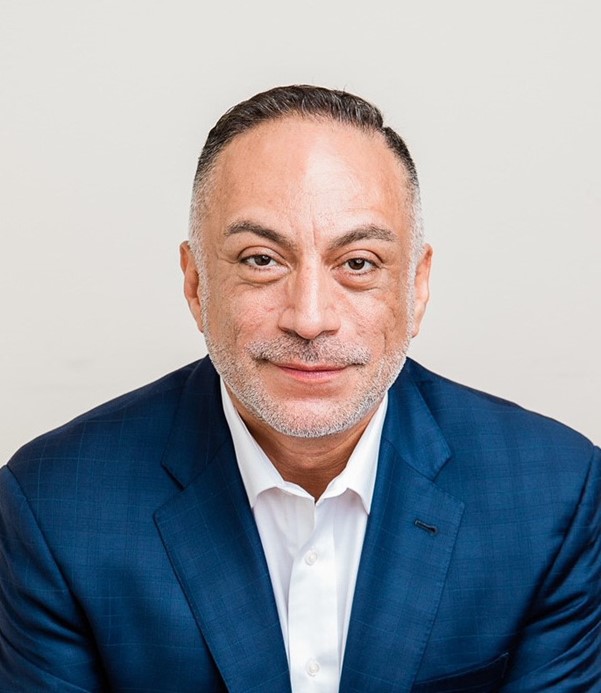 This year, in 2022, Francisco Sanchez was chosen by President Biden to be the Associate Administrator for the Small Business Administration’s Office of Disaster Assistance. Making preparations to uproot his life in Texas, where he was born and raised, to serve in Washington, Sanchez is “honored to be called to serve in the administration.” When asked if he was anxious at all to leave his life-long home of Texas, he expressed a worry about finding authentic, quality Mexican food in DC, but remarked he was glad he could get Whataburger ketchup in stores now.
This year, in 2022, Francisco Sanchez was chosen by President Biden to be the Associate Administrator for the Small Business Administration’s Office of Disaster Assistance. Making preparations to uproot his life in Texas, where he was born and raised, to serve in Washington, Sanchez is “honored to be called to serve in the administration.” When asked if he was anxious at all to leave his life-long home of Texas, he expressed a worry about finding authentic, quality Mexican food in DC, but remarked he was glad he could get Whataburger ketchup in stores now.
In his new position at the SBA, Sanchez will focus solely on disaster prevention, recovery, and resilience. With the Corona virus still an active factor in the workplace, Sanchez helps connect small business owners with the governmental programs that can help keep their business resilient to disaster, as well as help them recuperate losses caused by disasters. Mr. Sanchez expressed that he was happy his new position allowed him to focus on helping Americans during times of unexpected duress, and displayed genuine passion when discussing plans to not only tackle natural disasters as they arise, but also tackle the climate circumstances that are escalating these disasters. Sanchez was chosen for this position on account of his service to the people of Harris County.
One year ago, when the rest of us were huddled in the dark under blankets, Francisco Sanchez was at work with his action committee crafting public messages and directing aid. While many of us were taken by surprise by the winter storm, it’s been Mr. Sanchez’s job to make sure that Harris county is always prepared. Francisco recalls being hired for his position in the Harris County Department of Homeland Security and Disaster Prevention in 2007, having been asked to come and work for just a year there in the department. Mr. Sanchez calls what followed, “the longest year of my life.” During his tenure as the Harris County Deputy Homeland Security & Emergency Management Coordinator, which would end up lasting 15 years, Sanchez led action committees through floods, hurricanes, winter storms, the world series and two Super Bowls. During the years of 2007 to 2022 when Sanchez was working for the city, Houston faced a presidentially-declared disaster on an average of every nine months, including four of the nation's top ten most costly disasters.
Sanchez remembers crafting messages to safely advise Harris County residents on sheltering in attics and on roofs during Hurricane Harvey, something that few residents had experience with at the time. He and his team had to make the decisions concerning what information was most important and pertinent to the citizens seeking refuge in their attics. After the crisis passed, Sanchez and his action committee helped lead the charge of disaster recovery, time and time again. In 2018, during his “very long year,” Mr. Sanchez also earned his Master’s in Public Administration from Sam Houston State University, adding to his bachelor’s degree in Political Science from the University of Houston. Sanchez has been making tough decisions for the better part of twenty years, and advises students to put themselves into situations where they need to make decisions. “Making decisions is something you have to practice. My advice to those heading into the workforce is to be bold, be humble, and be flexible. Students in new positions can afford to be brave and put themselves out there to get results.” Francisco Sanchez models these values, and Sam Houston is proud to call him one of our own. We join with Harris County in wishing him resounding success in his new position.
Amanda Lee
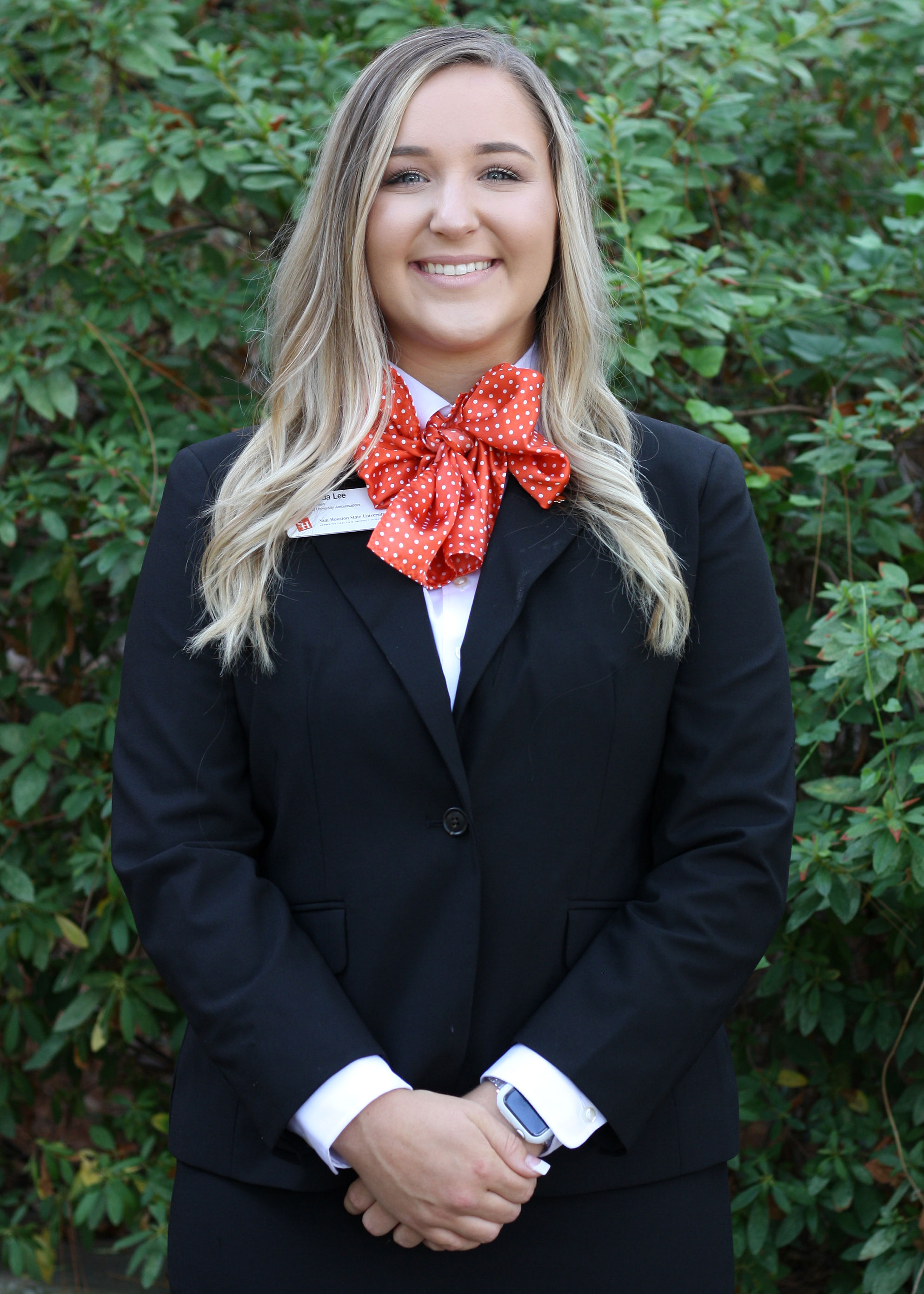 Amanda Lee is a senior at Sam Houston State University majoring in Communication Studies. Aside from being an upstanding student, she is involved in a variety of organizations both on and off-campus. Lee grew up in Jacksonville, a small East Texas town, and originally moved to Huntsville to pursue a degree in business. However, after realizing her true passion for communication, she changed her major and hasn’t looked back since.
Amanda Lee is a senior at Sam Houston State University majoring in Communication Studies. Aside from being an upstanding student, she is involved in a variety of organizations both on and off-campus. Lee grew up in Jacksonville, a small East Texas town, and originally moved to Huntsville to pursue a degree in business. However, after realizing her true passion for communication, she changed her major and hasn’t looked back since.
Recently, Lee was appointed by Governor Greg Abbott as a Student Regent for the Texas State University System, which is a prestigious position with a rigorous application process. “A Student Regent is a non-voting member of the Board of Regents who governs the institutions in the Texas State University System,” Lee said. “I get to go to all the meetings where they’re talking about business that is being conducted at each university.”
Because of COVID-19 restrictions, the Board of Regents is operating slightly differently, with less travel and more meetings hosted virtually. Nonetheless, Lee said her experience has been nothing but exciting and informative. “Day to day is a little bit different, because our board meetings got pushed back, so there’s a little bit of more leeway just because they’re going to be over Zoom,” Lee said. “Overall, as a Student Regent, I get to represent about 86 thousand students.”
Since freshman year, Lee has worked as a Student Lead in the Vice President’s Office for Student Affairs under the direction of Frank Parker. Through her role in this position, Lee said her boss has become a mentor and a role model for how she wishes to lead. “Frank Parker is someone who encompasses the true spirit of leadership and what that looks like,” Lee said. “He is personable and actually gets to know people so that it’s fun to do work with them.”
Reflecting on the past four years at Sam Houston, Lee said she has held countless positions in a wide variety of extracurricular activities and organizations. However, two positions specifically have taught her especially well what it means to make connections with students and faculty alike. “My favorite position of course is being the past Student Body President, but also being an Orange Key, which are university ambassadors that work with university officials who love to ask for students’ opinions on certain aspects of the university.” Lee said. “Both of these allow you to represent the students, but also see a lot of how higher administration works.”
Lee has dedicated an extensive amount of time to make a name for herself on campus and leave a legacy that others will remember. Dr. Terry Thibodeaux, former Communication Studies Department Chair, said he quickly recognized Lee’s efforts to further herself in both her academics and extracurriculars. “She represents the best of a student leader,” Thibodeaux said. “She’s done a tremendous job in her studies and she’s a major in our department. People gravitate towards Amanda. She’s very confident and she knows how to get things done.”
While self-motivation can go a long way, Lee said there have been a couple of other key factors that have ensured her success throughout her college career. “I’ve had a really good support system that’s given me that drive to continue to find out the depths of this university. I’m also a good planner. I plan things down to the hour. I know that seems excessive, but I’ve learned to plan my day around these hours to make sure I get things done, while also taking time for self-reflection.”
Looking towards the future, Lee said she plans to one day become a communications director of a company and hopes to look back on the mark she has left at Sam Houston. While Lee remained fearless in immersing herself in campus life, she understands how daunting it may be for other students looking to get involved. However, Lee said becoming involved will present numerous opportunities and be abundantly beneficial overall.
“I think it’s really cool to establish yourself in an organization because these are the people that are going to trust you and that are going to back you up when you want to run for those other positions,” Lee said. “I think it’s also a really big thing in college that we do come for academics and we do come to earn a degree, but we also come to gain connections. If you can find connections in the university by staying invested in your organization, it will help you in the long run for sure.”
Ilexus Williams
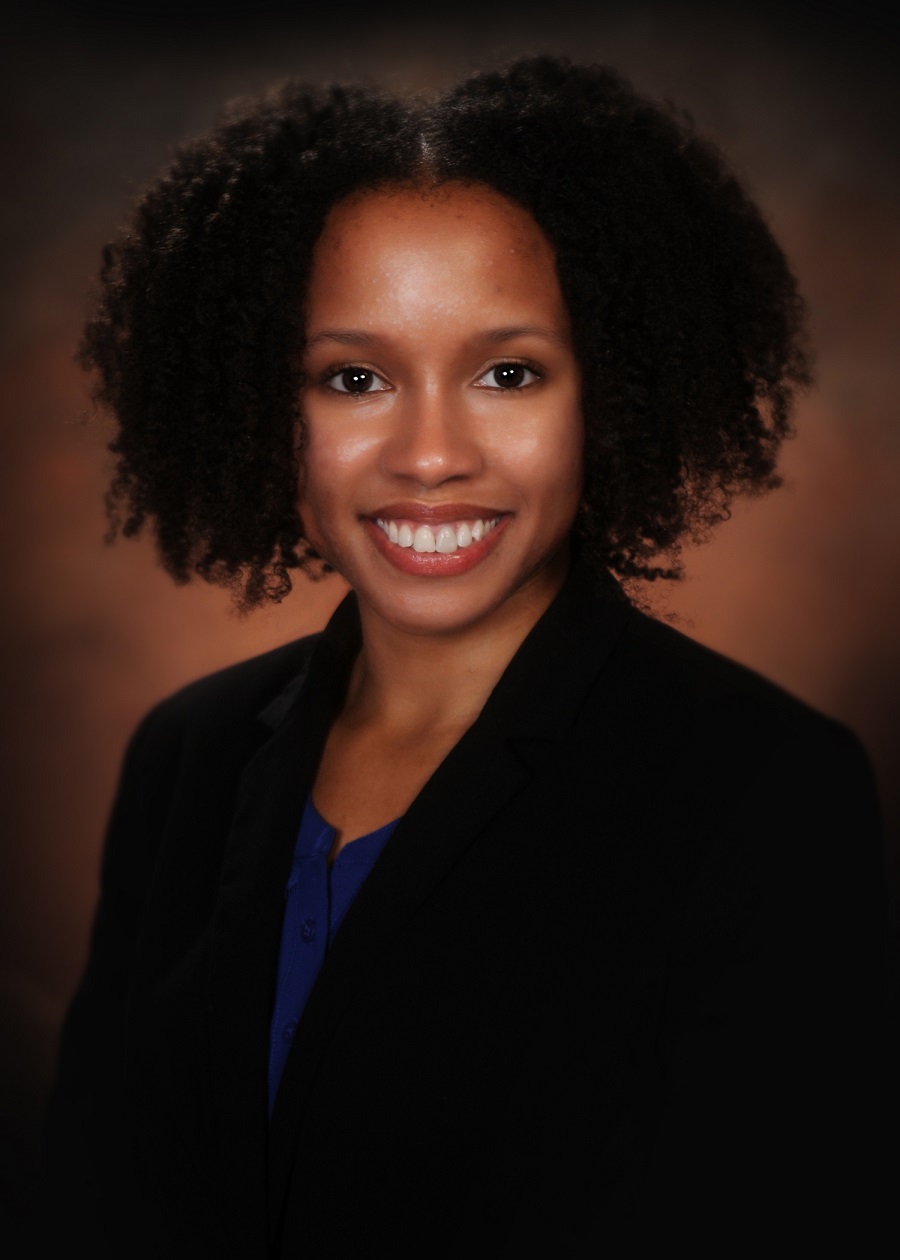 In college, students are required to take a couple of political science classes including American Government and Texas Government, to complete their degree plan. Although these classes provide information about monumental historical events through textbooks and lectures, witnessing where these events took place helps students understand their significance at a deeper level. Sam Houston State University’s Center for Law Engagement and Politics works to provide educational opportunities outside of the classroom and has recently implemented a new trip that focuses on Civil Rights.
In college, students are required to take a couple of political science classes including American Government and Texas Government, to complete their degree plan. Although these classes provide information about monumental historical events through textbooks and lectures, witnessing where these events took place helps students understand their significance at a deeper level. Sam Houston State University’s Center for Law Engagement and Politics works to provide educational opportunities outside of the classroom and has recently implemented a new trip that focuses on Civil Rights.
Since 2005, a select group of students from SHSU, along with the director of LEAP, Mike Yawn, take a trip to Washington to attend the presidential inauguration. However, because of the ongoing COVID-19 pandemic, that trip was canceled to avoid large crowds and prevent the spread of the virus. Instead, a trip to various notable Civil Rights sites in the South was planned. The group began their trip in Mississippi, where they had the opportunity to visit the home of Medgar Evers, a notable civil rights activist in the 1950’s. After that, they traveled to Louisiana to see where Homer Plessy was arrested, due to violating the state’s separate car laws. From there, the group headed to Alabama to stop by Dexter Avenue King Baptist Church, where Dr. Martin Luther King Jr. served as their pastor. Next, they traveled to Tennessee to see the Lorraine Motel and then concluded their trip in Arkansas to visit Little Rock Central High School, which was the first school to allow African American students to attend. Professor Yawn said the trip was highly educational and benefitted the students tremendously. “Everybody should have a foundation of human and civil rights, and the more education the better. I think by actually visiting these sites, particularly in a small group setting, brings the information to light in a particular way that may be more difficult to do in the classroom,” he said.
The trip aimed to broaden students’ horizons and remind them of how far we have come as a nation in terms of equal rights and justice. Ilexus Williams, a senior political science major at Sam Houston State said visiting various civil rights sites was influential to her life because she was able to travel to monumental historical sites that she might have not been able to under normal circumstances. “The most impactful site for me was the Lorraine Motel, which was the assassination site of Martin Luther King Jr. His advocacy speaks to perseverance. King saw an issue in our society and consistently worked to solve it along with other notable civil rights activists. Martin Luther King Jr.’s actions still speak volumes over 50 years later,” Williams said.
Williams herself has been actively involved in the LEAP organization on campus and spoke to how it helped develop her leadership skills over the past four years. “Right before coming to college, I made a promise to myself to ‘expand my horizons and get outside of my comfort zone’ and LEAP helped make the promise I made, as a freshman, a reality. I was able to build my leadership abilities as the Vice President of Operations for the LEAP Ambassadors and Vice President of Finance and Membership for the Pre-Law Society,” she said. According to Professor Yawn, before the Coronavirus pandemic began, the LEAP organization would normally participate in or host about 150 programs a year to give students a chance to meet and interact with political figures and attend community events. Williams expressed her gratitude towards the organization and shared how it has been fundamental in shaping her outlook on the world. “I have had the opportunity to gain valuable insight from notable political figures such as Susan Rice, Hillary Clinton, Nikki Haley, and David Kaye. Also, I have been able to learn about various cultures, cuisines, and art through educational trips to destinations such as Chicago, Illinois, Madison, Wisconsin, and Jackson Hole, Wyoming. I credit these opportunities for being the foundation and stepping stone for my future career and my development as a young professional,” Williams said.
Going forward, Professor Yawn said the organization hopes to make this trip an annual event, as well as attend the presidential inauguration in 2025, if the COVID-19 pandemic has ended. “By better understanding the struggles people have faced to fully achieve our version of democracy we can better overcome obstacles in the future. We can work together and understand each other to make for a better democracy, one that more closely resembles democratic ideals,” Yawn said.
Tia Hambrick
Serving in the military is one of the most selfless acts one can make. It requires a level of mental and physical toughness that not many of us are used to. Airmen put their life on the line to defend our country and are trained to be alert, as situations can change in an instant. Being stationed away from home in a completely different country is nerve-racking to say the least. Similarly, being a college student is also a challenging role for someone to take on, as classes are rigorous and days are long. Often, a student will have to stay up doing endless amounts of coursework, just to make the grade. Moving away from home and staying in a dorm requires a bit of adjusting as well. Both roles, while challenging in and of themselves, are not usually two that a person would sign up to do simultaneously. However, Tia Hambrick is an exception to this, as she has taken on the roles as both soldier and student and is succeeding.
Growing up, Hambrick witnessed her father’s commitment to his country, as he served in the Navy. Although she was born in New Jersey, Hambrick and her family relocated to Texas when she was 10 and has lived here since. Hambrick said she always knew she would serve her country in some capacity, and when the opportunity presented itself, she jumped at the chance to take on a new role. “Enlisting in the Air Force in 2012, I began what has been an interesting and rewarding career,” Hambrick said. “I wanted to experience the camaraderie of military life, and I wanted to do so alongside the other men and women who defend this country each day.”
While Hambrick pursued a life in the service, she said she simultaneously attended school online and earned a Bachelor of Applied Arts in English from Lamar University. “I love everything about the English language, how words can take on multiple meanings and how we can convey a thought, expression or idea,” Hambrick said. After earning her bachelor’s degree, Hambrick sought to reach new heights and applied to the Master of Arts in Technical Communication program at Sam Houston. “I chose to enroll in the program because I wanted to sharpen my writing skills,” Hambrick said. “I scoured the internet looking for the program that would fit into my lifestyle. The program I selected would have to be completely online, and the university needed to be military friendly. SHSU has exceeded my expectations.”
Finding an equal balance between school and work can be quite stressful. Hambrick said she’s currently deployed in Kuwait, which has made the process even more difficult. “I’m still trying to perfect my time management skills,” Hambrick said. “While I don’t always get it right, I’m committed to the process. What I have learned thus far is that I’ve always got time for things that I put first.” Completing homework and attending Zoom meetings from another country goes far beyond what the average student experiences. Nonetheless, Hambrick’s dedication is seen by family, friends and professors alike.
Dr. Carroll Nardone, Professor of Technical Communication in the English Department at SHSU said Hambrick’s commitment to her education is well above what she expected of a student in her position. “She stands out as somebody who finds a way to get things done, no matter what’s thrown at her,” Nardone said. “She has all kinds of reasons to say I can’t, and yet I never heard that from her.” Nardone said Hambrick met deadlines and never asked for extensions on projects or assignments. “As a working graduate student, she could’ve dipped in and out as she needed to, just to keep her head above water,” Nardone said. “She would’ve had every right to do that, but she was involved in the classes. She didn’t just do the minimum.”
Although Hambrick has found herself in a unique predicament, she has learned to discipline herself and has proved to herself that she can do anything she sets her mind to. “Being deployed while going to school is not for the faint of heart,” Hambrick said. “Being in the Middle East there is a nine hour time difference… the internet service is intermittent, so I’ve had to come up with a backup plan.” Despite whatever difficulties arise, Hambrick has adjusted well to military life and said she remains devoted to the roles she’s taken on, as a student and airman. “The fact that I am on a military base in a foreign country, where the threat level could increase at a moment’s notice is something that I have just come to accept and live with,” Hambrick said. “Sometimes my military life and my civilian life collide, and I find myself somewhere in the middle, but I’ve enjoyed the journey thus far.”
Kevon Hunter
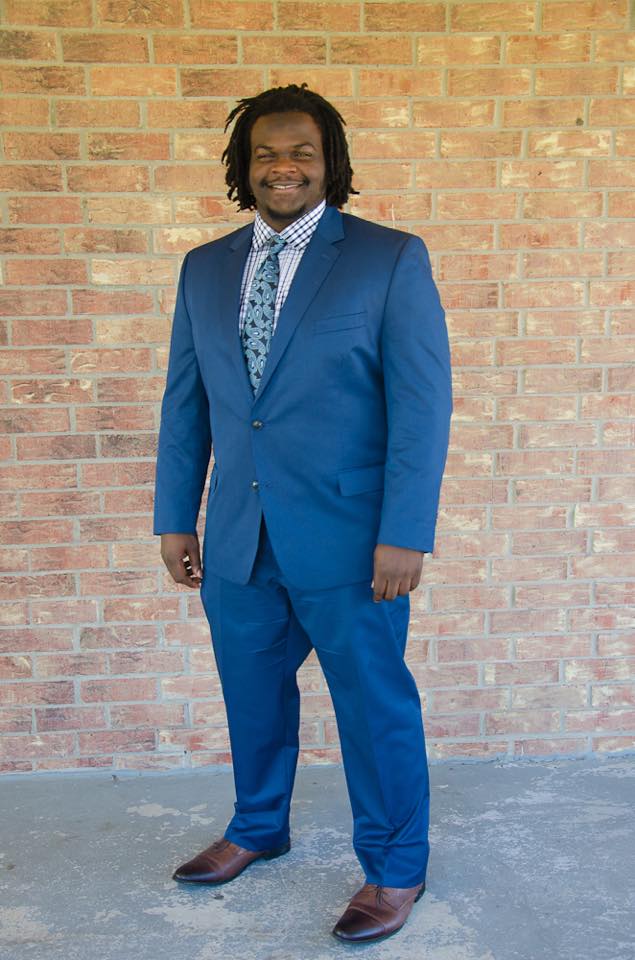 Life after graduation is a daunting time for many students. Often, students are worried they will not be able to find a job and are pressured by many people to figure out their next steps quickly. Additionally, in the months leading up to graduation, students are having to juggle completing schoolwork, staying involved in extracurriculars, and finding time to apply to graduate school or a job in their field. While the journey to graduation and a job may be challenging, preparing for a successful future before graduation can make a world of a difference.
Life after graduation is a daunting time for many students. Often, students are worried they will not be able to find a job and are pressured by many people to figure out their next steps quickly. Additionally, in the months leading up to graduation, students are having to juggle completing schoolwork, staying involved in extracurriculars, and finding time to apply to graduate school or a job in their field. While the journey to graduation and a job may be challenging, preparing for a successful future before graduation can make a world of a difference.
Kevon Hunter, a Sam Houston State alum, graduated with a Bachelor of Arts in History in 2016 and a Master of Arts in History in 2018. During his time at SHSU, Hunter was a student athlete playing football and was an active member in the history club on campus. Despite his limited free-time, he managed to schedule time to volunteer at numerous museums in Huntsville, including the Samuel Walker Houston Memorial Museum, The Wynne Home and Arts Center, and the Texas Prison Museum. He also interned for George Ranch Park in Richmond for six months. He was then offered a full-time position, and he currently serves as a Programs and Volunteer Coordinator. “Although it may seem surprising to most people, this field is very competitive, and it can be difficult to try to get a job by just completing basic schoolwork. So, I would take opportunities to volunteer to get extra training and become familiar with different databases,” Hunter said.
While his volunteerism helped him excel in his career field, Hunter also praises his time in the classroom at Sam Houston. In his current position at George Ranch Park, he is tasked with performing reenactments of famous historical figures, as he once did in a history class during undergrad. “In Dr. Doleshal’s class, he used a teaching tool where we would act as characters in history and kind of live in those people’s shoes. We were able to see their decision-making process and understand it better,” Hunter said. Overall, those skills set him apart from other applicants because he can tell a narrative from a historical figures’ point of view and make it interesting to the audience.
Clinical Assistant Professor at Sam Houston State University, Dr. Zachary Doleshal, worked closely with Hunter and served as a mentor for him during his time at the university. The two worked on an exhibit on segregation in Walker County, where Hunter was able to grasp the ethics and basic practices of public history at a more succinct level. “Through his experience in the project, he became a very good candidate for a job. While he’s highly intelligent, he can relate to the general public and make people feel comfortable and engaged in what he’s interested in. He learned how to put the truth and evidence first and then take that and apply it,” Doleshal said. While the education he received in various classes set him up for success, Hunter succeeded because of his hunger for knowledge and determination to learn.
Looking ahead, Hunter hopes to become a museum director, using his current position as a the first steppingstone. Since beginning work at George Ranch Park in 2019, Hunter said he’s learned a lot and has remained committed to his love of history. Presently, he is a member of the Fort Bend Archaeological Society as well as the George Ranch Rodeo Committee.
Hunter serves as a great example of a person whose drive and passion set them on the right track to gaining a successful career in public history.
Thisia Sayers
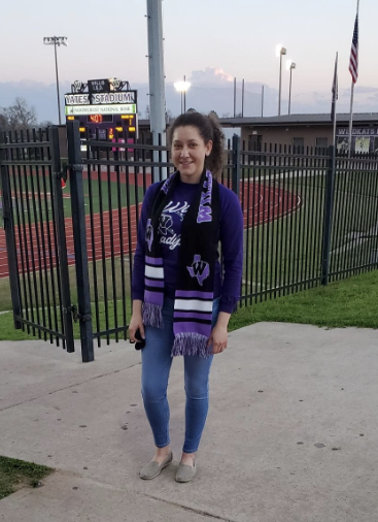 Thisia Sayers was born and raised in Aruba and moved to Texas in 2013. After the birth of her second child, she decided to switch career paths. This journey began at Lone Star College. Next, she transferred to Sam Houston State University to complete a Bachelor’s degree in Spanish with a minor in education. During this time, Thisia joined SIGMA DELTA PI National Spanish Honor Society and LatinX Graduate Organization. In May 2020, she graduated with a degree in Spanish. With plans to be a high school Spanish teacher, she continued her education at Sam Houston with a Master’s degree in education through the 4+1 Teach program. She is on schedule to graduate in May 2021.
Thisia Sayers was born and raised in Aruba and moved to Texas in 2013. After the birth of her second child, she decided to switch career paths. This journey began at Lone Star College. Next, she transferred to Sam Houston State University to complete a Bachelor’s degree in Spanish with a minor in education. During this time, Thisia joined SIGMA DELTA PI National Spanish Honor Society and LatinX Graduate Organization. In May 2020, she graduated with a degree in Spanish. With plans to be a high school Spanish teacher, she continued her education at Sam Houston with a Master’s degree in education through the 4+1 Teach program. She is on schedule to graduate in May 2021.
Today, Thisia is a mother of two, a wife, a teacher at Willis High School, and a graduate student. She teaches Spanish 1 and 2. In her classroom, the focus is on building social skills, communication, and learning Spanish in a hands-on format with a touch of fun. Her degree in Spanish has opened many doors and opportunities for professional growth. Since there is a need for learning/teaching of world languages to prepare our citizens for future jobs. As a result, Thisia has decided to pursue a Master’s in Spanish, starting this fall. She believes that furthering her education in languages will expand her knowledge and benefit our community.
